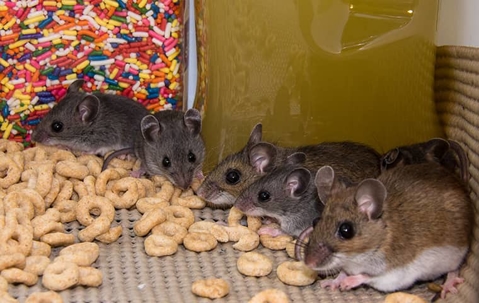One common intruder that New Jersey homeowners face is the tiny yet troublesome mouse. In this guide from the pros at Heritage Pest, we will shed light on signs of mouse invasions, the problems they bring, why traditional methods like traps can fall short of preventing a rodent takeover, and when you need to call in the mouse removal pros.
Signs Of A Mouse Infestation: How To Spot Them Early
As a leading pest control expert in New Jersey, our team at Heritage Pest emphasizes the importance of early detection. Mice are notorious for their ability to quietly infiltrate homes, and spotting the signs of an infestation is key. Here are some of the common clues to watch out for:
- Unexplained scratching or scurrying noises in walls, especially at night
Small, dark mouse droppings near food sources or along baseboards
A musty odor
Chewed food packaging, wires, or furniture
Shredded paper, fabric, or insulation in hidden corners
Smudges or footprints along baseboards, often with droppings nearby
Understanding these signs early on can prevent a minor issue from turning into a full-blown mouse infestation.
Why Mice In Your House Can Be So Problematic
House mice aren't just pesky creatures that nibble on food; they pose serious risks to both property and health. Their habit of constantly gnawing on things can damage furniture, walls, and even electrical wiring, leading to potential fire hazards. Mice can also carry various diseases, posing health threats to New Jersey residents.
It's not just about eliminating an annoyance; it's about safeguarding your home and family's well-being.
Why Mouse Traps Aren't Enough
While traditional mouse traps may catch a few mice, they often fall short of controlling the entire population. Here are a few common reasons why mice traps can fail:
- Randomly placing traps may not target high-traffic areas where mice are active, reducing the chances of successful catches.
Using only a few traps might not cover the entire affected area, allowing mice to roam freely in untreated spaces.
Mice reproduce rapidly, and a small number of traps may not keep up with the growing population, leading to an ongoing infestation.
Failing to identify and seal entry points means new mice can keep entering the premises, rendering trap efforts less effective.
Mice can become wary of certain baits, making them less likely to be lured into traps, especially if they have encountered similar setups before.
Mice may learn to avoid areas where there are traps.
Traps alone may not address the root cause of the infestation, such as unhygienic conditions or easily accessible food sources, leading to recurring problems.
Traps might inadvertently catch non-target animals, posing ethical concerns and potentially complicating the situation.
Neglecting to check and reset traps regularly means missed opportunities to catch mice, allowing the infestation to persist and potentially worsen as mice continue to breed or new ones enter the home.
The Most Effective Mouse Control For Your Home
Heritage Pest offers a range of effective mouse control methods for getting rid of mice in New Jersey. Our experts conduct a detailed inspection to identify entry points, nesting areas, and sources of attraction.
Using a combination of traps, baits, and exclusion methods, we ensure a comprehensive approach to mouse control in New Jersey that will eliminate the current infestation and prevent future ones, providing homeowners with peace of mind.
If you're dealing with a mouse infestation in New Jersey, don't wait. Contact Heritage Pest for a customized and effective solution.

